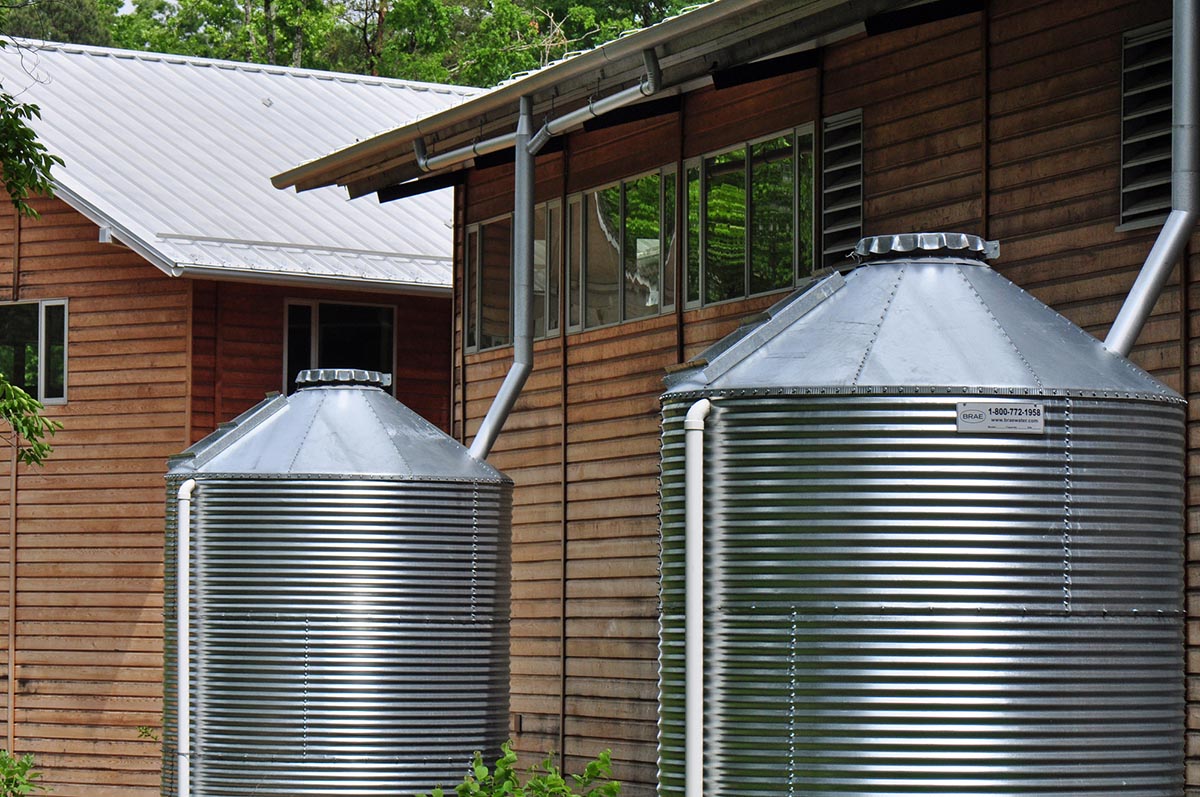We may earn revenue from the products available on this page and participate in affiliate programs. Learn More ›
Q: We just moved across the country, and it’s pretty dry out here. I’d love to collect rainwater for my garden but I’m wondering: Is it illegal to collect rainwater?
A: Kudos to you for hoping to practice conservation by collecting and reusing rainwater. While rainwater collection is legal in every state in the nation—there is no federal regulation—many states and municipalities do have restrictions on the practice. Other states, particularly western states with dry climates, encourage rainwater collection (aka rainwater harvesting) to ease the burden on local water systems. Your state may even offer incentives for rainwater harvesting!
Rainwater collection regulations generally seek to control the amount of water that can be collected, the method of collection, and the intended use of the water. The bottom line? Check with your local authorities to determine which, if any, restrictions are in place. If you fail to follow the rules, you may face such consequences as fines or even jail time. Read on to understand the reasons for restrictions on collecting rainwater, and review various states’ rules.
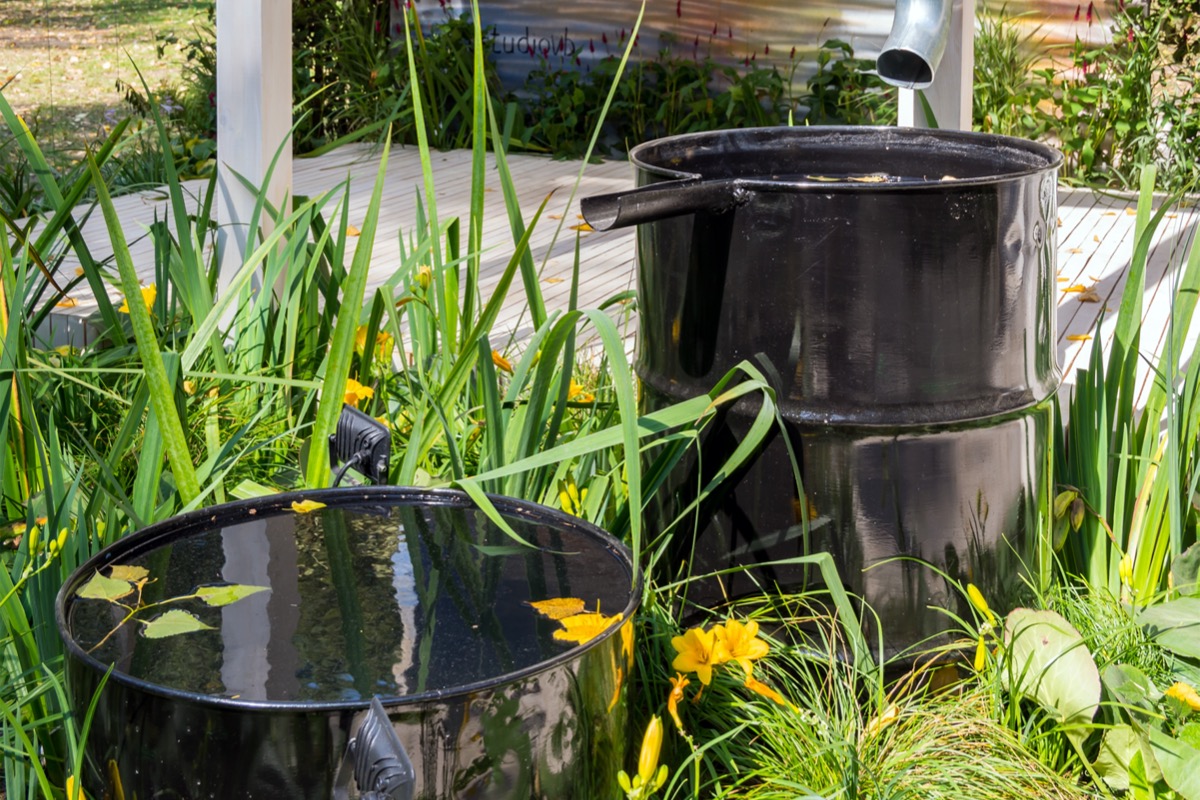
Restrictions on rainwater harvesting in the United States date back to the California Gold Rush of 1848 to 1855.
Miners’ use of hydraulic processes in dry areas of the state was controversial during the Gold Rush, leading to regulations controlling their rights to diverted water. A policy of prior appropriation ensued, as did subsequent laws that have changed over the years. Now, some states that once restricted rainwater collection currently encourage it.
RELATED: Solved! What is a Rain Chain?

Today’s rainwater collection regulation is a matter of public health.
Most states allow rainwater harvesting on residential and/or commercial properties for non-drinking purposes, such as watering the lawn. But there may be strict rules against harvesting water for drinking, as rainwater can contain harmful substances, such as animal feces, E. coli, and pesticides. Those who collect rainwater for drinking and other human consumption purposes (e.g., cooking or showering) must install a filtering setup that complies with state or local government policies.
Some states have rainwater collection laws to regulate the amount you may harvest.
Any rainwater you harvest won’t enter nearby streams, ponds, and other natural bodies of water—and that has the potential to disrupt ecosystems. The rainwater collection amount that states with restrictions allow can vary: Colorado allows only a total of 110 gallons, while Illinois permits residents to harvest up to 5,000 gallons without a permit.
RELATED: All You Need to Know About Dry Wells
Some states or towns may also regulate your rainwater collection system.
Rain barrels hold approximately 55 gallons of water and are typically designed to catch water from gutter downspouts. A rainwater cistern is a tank that can hold much more, up to 10,000 gallons. While both are popular, approval for use will depend on the state you live in.
Rain barrels are typically approved and unregulated (except for in Colorado, where they are regulated). Cisterns may require a professional engineer or plumber to design the system to ensure the water is properly harvested and filtered for use.
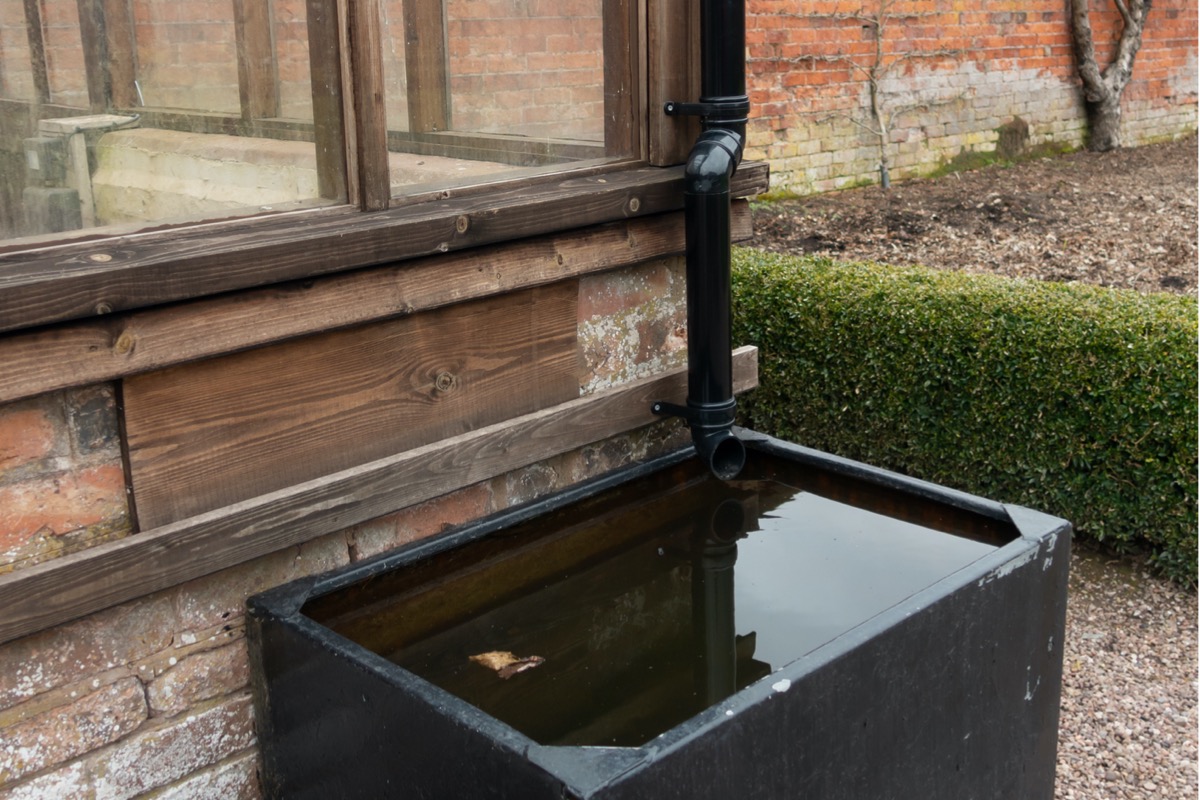
Check with your state’s department of agriculture, health department, or water board for rainwater collection regulations.
Laws regarding rainwater collection are subject to change as climate changes and drought become more of a concern. The plumbing code for each state—which some states use to regulate domestic rainwater collection—can also change. Since rainwater collection isn’t regulated by federal law, it’s important to stay current on local guidelines.
Even states and counties with no restrictions on collecting, including those that offer incentives for rainwater harvesting, will likely regulate collection practices. As to using rainwater for drinking, the all-important water filtration system will most likely be subject to state or county regulation. Be sure to check local laws before investing in a rainwater collection system.
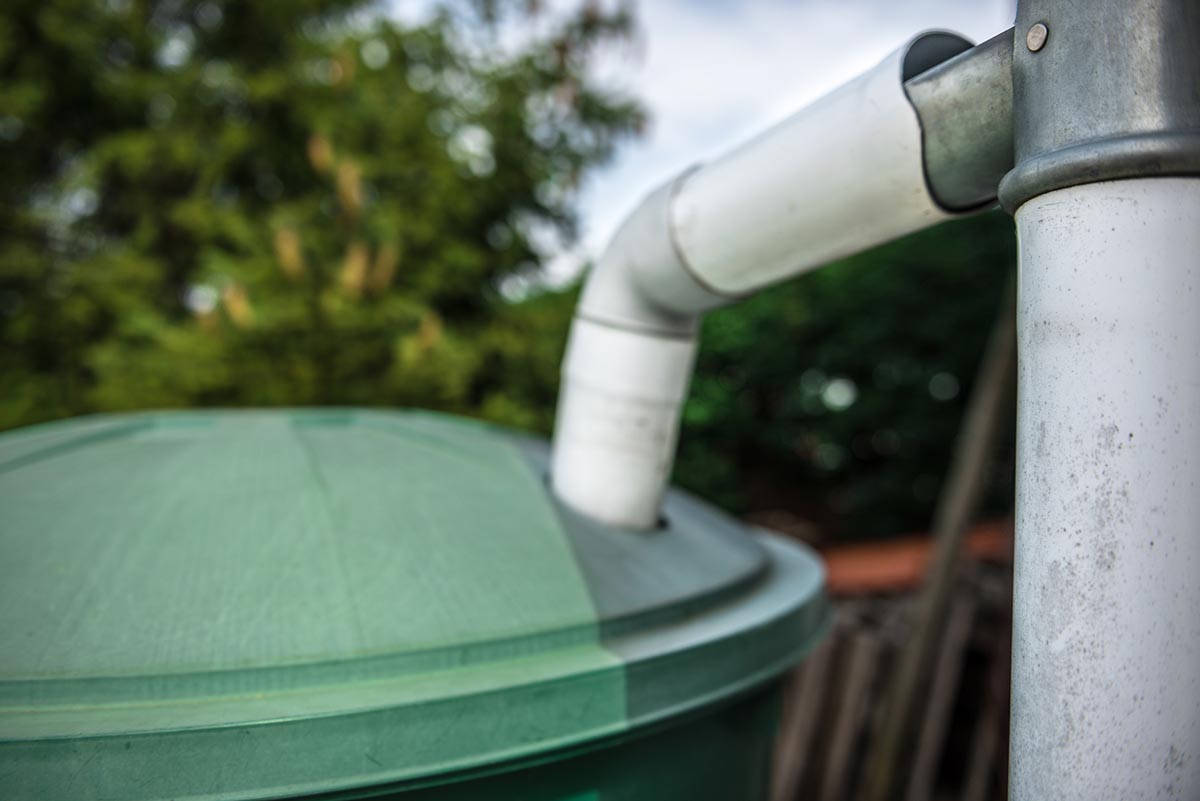
The list below outlines rainwater harvesting policies in various states, from those with no restrictions to those with heavy regulations.
- Arkansas (Heavily Regulated): Rainwater collection is permitted for non-drinking purposes only. The system must comply with Arkansas Plumbing Code, be designed by a state-licensed professional engineer, and include cross-connection safeguards to avoid contaminating other water sources.
- California (Somewhat Regulated): Per the Rainwater Capture Act, harvesting is allowed without a permit but usage must abide by California State Water Resources Control Board. Rainwater intended for ponds or irrigation purposes requires a license available through the board.
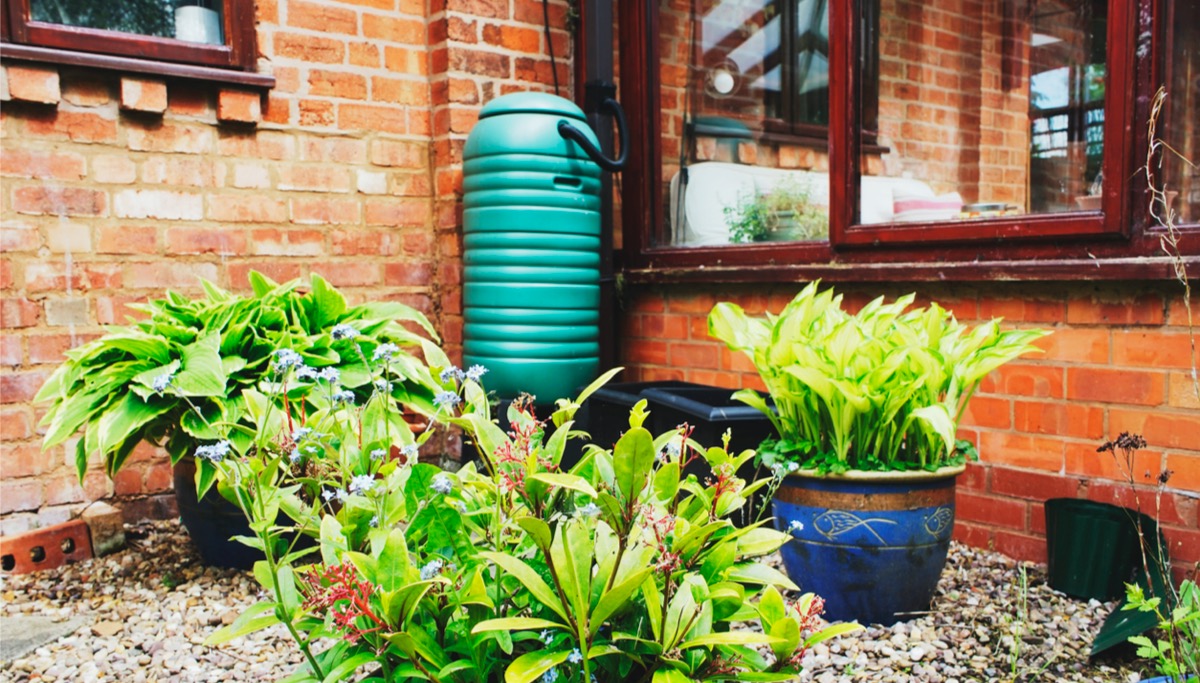
- Colorado (Heavily Regulated): Collection is restricted to only two barrels with a maximum capacity of 110 gallons. Harvested water can only be used on the property from which it came for non-potable purposes, as the state has ruled that residential rainwater collected from rooftops is unsafe to drink.
- Delaware (No Restrictions): Delaware has no restrictions regarding rainwater collection for residents. The Delaware Department of Natural Resources and Environmental Control offers incentives for collecting rainwater, such as discounted rain barrels.
- Florida (No Restrictions): There are no restrictions on rainwater collection, and many counties offer incentives for doing so, such as through the Water Savings Incentive Program (WaterSIP).
- Georgia (Somewhat Regulated): There are no restrictions on non-potable use, but individual county rules exist in Georgia for drinking collected rainwater. Requirements include using an approved reservoir and filtration system, among others.
- Illinois (Somewhat Regulated): Rainwater collection in Illinois for non-drinking purposes must use a system in compliance with the Illinois Plumbing Code and is limited to 5,000 gallons. Exceeding that amount for commercial purposes requires Department of Public Health approval.
- Kansas (Somewhat Regulated): Rainwater collection for domestic use is allowed without a permit, for livestock, pasturelands, or up to 2 acres of lawn and garden. Rainwater harvesting for commercial irrigation and other purposes requires a permit through the Kansas Department of Agriculture.
- Louisiana (No Restrictions): The Louisiana Department of Natural Resources encourages the practice of harvesting rainwater for outside uses. Green Light New Orleans distributes rain barrels to residents.
- Maryland (No Restrictions): Some counties offer incentives for rainwater harvesting. The rebate program for residential properties through the Rain Check Rebate Program (Prince George’s County), for instance, offers $2 per gallon, up to $4,000, as long as rain barrels collect 50 gallons.
- Nevada (Heavily Regulated): Since 2017, rainwater harvesting is legal solely for domestic, non-potable use, among other restrictions.
- New Jersey (No Restrictions): Rainwater collection incentive programs for New Jersey residents include the Capture, Control, and Conserve Reward Rebate Program. Rebate limits are $2,500 for residential properties and $10,000 for commercial properties.
- North Carolina (Heavily Regulated): The North Carolina Department of Environment and Natural Resources regulates non-potable-only use of rainwater harvesting for outdoor irrigation and plumbing use (e.g., flushing toilets).
- Ohio (Somewhat Regulated): The Ohio Department of Health and the Ohio Environmental Protection Agency oversee rainwater collection for both potable and non-potable uses. There are rules in place for private water systems that use cisterns for collecting rainwater for domestic use, including family dwellings, small businesses, barns, and campgrounds.
- Oklahoma (No Restrictions): The state’s Water for 2060 Act utilizes education and incentives to encourage residents to conserve water, including the use of rain barrels.
- Oregon (Somewhat Regulated): As regulated by the Water Resources Department, rainwater in Oregon can only be collected from roof surfaces. Harvested water can be used for drinking with the proper filtration.
- Rhode Island (No Restrictions): Homes and businesses in Rhode Island are entitled to a tax credit of 10 percent of the cost of installing a cistern to collect rainwater, not to exceed $1,000. The cistern must hold at least 50 gallons to qualify for the credit.
- Texas (No Restrictions): Texans may receive tax incentives for rainwater harvesting, which is regulated by the state’s Water Development Board, and harvesting equipment is exempt from sales tax and property taxes.
- Utah (Somewhat Regulated): As regulated by the Division of Water Rights, collecting rainwater in Utah is limited to 2,500 gallons. Harvesters must register for approval to capture and store precipitation under the Utah Division of Water Rights.
- Virginia (No Restrictions): Rainwater collection is encouraged in Virginia, where the state’s Alternative Water Supply Assistance Fund offers grants to businesses and individuals to help sustain rainwater collection methods.
- Washington (Somewhat Regulated): In Washington State, residents can only collect rainwater from their own property and only from a structure with another use besides collecting rainwater (such as a home or business). Some cities may reduce stormwater utility fees for commercial properties that use rainwater collection systems.

